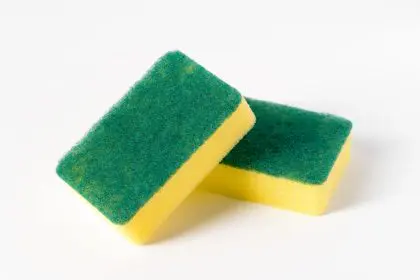You wash your dishes every day, wipe down your counters, and think your kitchen is clean. But there’s one item sitting by your sink right now that’s harboring more bacteria than your toilet seat — and you’re spreading those germs all over your dishes, counters, and food prep areas every single day.
That innocent-looking dish sponge is a bacterial breeding ground that’s putting your family at risk for food poisoning, and most people have no idea how dangerous it really is.
Why your dish sponge is a bacterial nightmare
Kitchen sponges are the perfect environment for bacteria to multiply rapidly. They’re moist, warm, and filled with food particles — exactly what harmful bacteria like E. coli, Salmonella, and Staphylococcus need to thrive.
Studies have found that kitchen sponges can contain up to 10 million bacteria per square inch, making them one of the most contaminated items in your entire house. That’s more bacteria than you’d find on your toilet seat, doorknobs, or even garbage cans.
The porous structure of sponges makes them nearly impossible to clean completely. Even when you rinse them with hot water or put them in the dishwasher, bacteria survive deep inside the sponge material where cleaning agents can’t reach.
How you’re spreading bacteria throughout your kitchen
Every time you use that sponge to wash dishes, you’re transferring bacteria from the sponge to your supposedly clean plates and utensils. Then you use the same sponge to wipe down counters, spreading those germs to food prep surfaces.
The problem gets worse when you use the sponge to clean up raw meat juices or other potentially dangerous spills. Those bacteria get trapped in the sponge and multiply rapidly, creating a concentrated source of contamination.
Even rinsing the sponge between uses doesn’t help much. The bacteria are embedded so deeply in the sponge material that surface rinsing barely touches them. You’re essentially using a bacteria-soaked cleaning tool on everything in your kitchen.
The shocking truth about popular cleaning methods
Many people think they’re being responsible by microwaving their sponges or running them through the dishwasher to kill bacteria. Unfortunately, these methods don’t work as well as you think.
Microwaving sponges does kill some bacteria, but it also creates hot spots where bacteria can survive. The irregular heating means some areas of the sponge stay cool enough for bacteria to live through the process.
Dishwasher cleaning is similarly ineffective. While the hot water and detergent kill surface bacteria, the sponge’s porous interior protects deeper bacteria from the cleaning process. You end up with a sponge that seems clean but is still contaminated.
Why this leads to mysterious stomach bugs
That unexplained stomach upset, diarrhea, or nausea that seems to come out of nowhere? It might be caused by the bacteria you’re spreading around your kitchen with your dirty sponge.
Food poisoning from kitchen cross-contamination often presents as mild symptoms that people dismiss as a stomach bug or something they ate. But the real culprit is the bacterial contamination happening right in your own kitchen.
Children, elderly family members, and people with compromised immune systems are particularly vulnerable to sponge-related bacterial infections. What seems like a minor stomach upset for a healthy adult can be serious for more vulnerable family members.
The simple solutions that actually work
Replace your kitchen sponges every three to five days, not every few weeks. This might seem wasteful, but it’s cheaper than dealing with food poisoning and much safer for your family’s health.
Better yet, switch to alternatives that don’t harbor bacteria as easily. Washable microfiber cloths can be thrown in the washing machine with bleach, effectively killing all bacteria. Disposable paper towels eliminate the bacterial buildup problem entirely.
For dishes, consider using a dish brush with synthetic bristles instead of a sponge. Brushes dry faster and don’t provide the same bacterial breeding environment that sponges do.
How to clean without spreading contamination
Use separate cleaning tools for different tasks. Never use the same sponge or cloth to clean raw meat areas and then wipe down other surfaces. This cross-contamination is how bacteria spread throughout your kitchen.
If you must use sponges, designate specific ones for specific tasks. Use one sponge only for dishes, another only for counters, and a third for general cleaning. This prevents bacteria from spreading between different areas of your kitchen.
Replace any sponge immediately after using it to clean up raw meat, poultry, or seafood juices. These protein-rich spills create ideal conditions for dangerous bacteria to multiply rapidly.
The cost of ignoring this problem
Food poisoning affects millions of Americans each year, and many cases originate from cross-contamination in home kitchens. The symptoms can range from mild stomach upset to severe dehydration requiring hospitalization.
Even mild food poisoning can cost you days of work, disrupt your family’s routine, and create unnecessary stress. The few dollars you spend on frequent sponge replacement or alternative cleaning tools is a small price to pay for protecting your family’s health.
Making the switch to safer kitchen habits
Start by throwing away your current kitchen sponges today. Replace them with microfiber cloths that can be washed in hot water with bleach, or commit to replacing sponges every few days.
Pay attention to how you clean different areas of your kitchen. Use separate tools for different tasks, and never use the same cleaning implement on surfaces that touch food after using it on potentially contaminated areas.
Your family’s health depends on the small decisions you make in your kitchen every day. Something as simple as changing how you think about dish sponges can dramatically reduce your risk of foodborne illness and keep your loved ones safer.
















